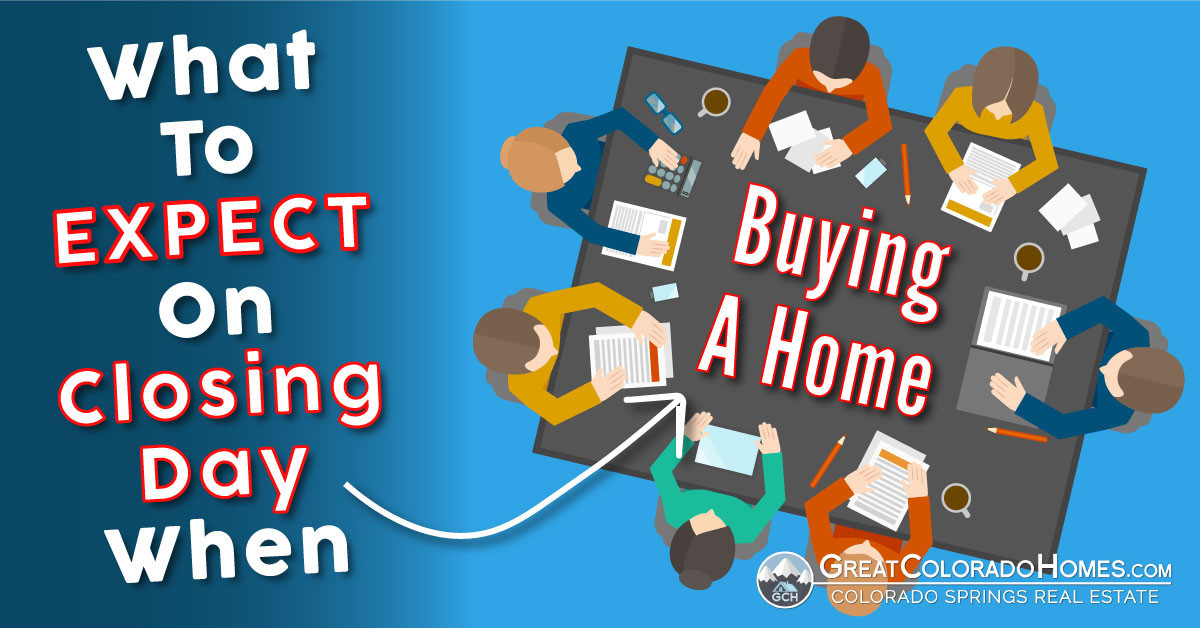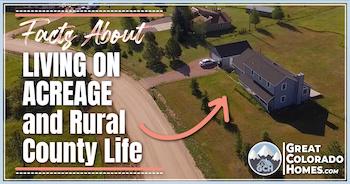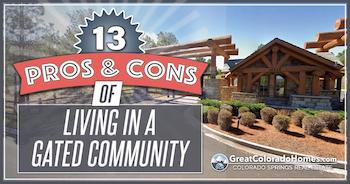What To Expect on Closing Day When Buying a Home
 When is our closing date? Do we meet at the house for closing? Will we be able to get the keys and move in on the closing day? How long will the actual closing take?
When is our closing date? Do we meet at the house for closing? Will we be able to get the keys and move in on the closing day? How long will the actual closing take?
These are some of the questions I’ve been asked as a Realtor® from my clients. Sometimes people are buying a home for the first time and have no idea what to expect. Other times, buyers have bought a house in another state and the closing process may be completely different. In this article, I’ll quickly explain what to expect at closing if you’re buying a home in Colorado.
Where are we closing?
 Closings generally take place at the title company that has issued the title policy for the home. This is a neutral place that has access to technology, so documents can be signed, emailed or faxed, and verified. Always check with your Realtor® to verify the address, as some title companies have multiple locations.
Closings generally take place at the title company that has issued the title policy for the home. This is a neutral place that has access to technology, so documents can be signed, emailed or faxed, and verified. Always check with your Realtor® to verify the address, as some title companies have multiple locations.
Some listing agents will try to require that both parties sign at their personal offices. The main purpose is to benefit the listing agent themselves. This is not a requirement of your transaction unless it is manually added to your contract, so don't feel obligated to close at the listing agent's office if you are ever put into this scenario as a home buyer.
Who will be there?
 The buyers, sellers, title rep, both Realtors, and the mortgage lender may all be at the closing table. It can be a full table, but most of the time it is a small group.
The buyers, sellers, title rep, both Realtors, and the mortgage lender may all be at the closing table. It can be a full table, but most of the time it is a small group.
At the closing table, a title company representative (closer) will act as scrivener to make sure all the documents are explained and signed appropriately by both parties. Typically, the buyer’s agent and the listing agent will also be in the room, as well as the lender (if local).
Closing usually happens with all parties in the same room, but occasionally the buyers and sellers might be in separate rooms, or the sellers might have already signed the documents at an earlier date & time. It is also possible to do a “mail-out” where no one is physically at the closing, and the documents are signed with a notary wherever the buyer or seller may be at the time. This is common for sellers who live out-of-state.
You may bring your children if you like, but sometimes closings can take 1-2 hours, and if you have younger kids, it may be tough for them to sit through that amount of time without mom's or dad’s attention.
When are we closing?
 You should know the closing date when you first make an offer on a property. It is written into the contract as the “closing date” at the very beginning. Make sure this date works for you because you are contractually agreeing to it right up front. The exact time will be set closer to the closing date, but the closing day is set in the beginning and requires a formal amendment to the contract in order to change it.
You should know the closing date when you first make an offer on a property. It is written into the contract as the “closing date” at the very beginning. Make sure this date works for you because you are contractually agreeing to it right up front. The exact time will be set closer to the closing date, but the closing day is set in the beginning and requires a formal amendment to the contract in order to change it.
Normally, that date is 30-45 days from the day the offer is made. The “possession date” is another date to fill in, and it is typically the same as the closing date, but depending on the buyer’s or seller’s needs, it might be different. A good REALTOR® will coordinate all of this for you.
 For a typical transaction, the buyers and sellers meet on the day of closing at the title company to sign the paperwork, and the buyers get the keys to move in right away. Another scenario would be that the seller needs time after closing to move and may need to do a “lease-back” from the new owner. The buyers would not take possession on the closing day, but at a later date. This could be 3 days, or it could be 30 days. The buyer has the right to collect rent from the seller and accepts all liability for being a landlord, so be careful with going this route! You also need to make sure that you have the proper insurance in place. The buyers will need to have their new policy go into effect the day of closing, and the sellers will need to have a renter’s insurance policy for their contents. Make sure to get proof of this from the seller!
For a typical transaction, the buyers and sellers meet on the day of closing at the title company to sign the paperwork, and the buyers get the keys to move in right away. Another scenario would be that the seller needs time after closing to move and may need to do a “lease-back” from the new owner. The buyers would not take possession on the closing day, but at a later date. This could be 3 days, or it could be 30 days. The buyer has the right to collect rent from the seller and accepts all liability for being a landlord, so be careful with going this route! You also need to make sure that you have the proper insurance in place. The buyers will need to have their new policy go into effect the day of closing, and the sellers will need to have a renter’s insurance policy for their contents. Make sure to get proof of this from the seller!
As mentioned previously, in the majority of transactions, sellers take a leap of faith and move out of their house the day before closing (or sooner) and trust that the buyer will close on time, therefore allowing them to move on to their next transaction. This may require the sellers to move twice, but at least they know they will have the money in hand from selling their house and will be able to move on to the next transaction.
As a seller, if you are moving locally and selling one house to buy another, you can do a simultaneous close. That is, sell your house at 9 am and buy your next house at 1 pm. This can create a domino effect and some stress if the first deal does not close, as it affects the 2nd transaction. Make sure your lender and title company are on board with going this route.
One final note on this subject of “when.” The REALTOR® and the buyer should walk through the property prior to closing to ensure that the inspection items were completed, the house is still standing, and that the seller’s possessions are no longer there. If you walk the property the day before closing and nothing is packed up, that is a big red flag! You will also want to check that the items you asked for in the original contract, like the security system or the wine refrigerator, are still in the house.
What will we be signing?
 Closing documents consist of a buyer’s package and a seller’s package. Typically, the seller signs documents first that give up their rights to the property. The seller side also has the least amount of paperwork, so they typically go first.
Closing documents consist of a buyer’s package and a seller’s package. Typically, the seller signs documents first that give up their rights to the property. The seller side also has the least amount of paperwork, so they typically go first.
Next, the closer will work on the loan package for the buyer (if they are getting a loan), because those documents will get sent to the lender for verification while the rest of the closing is finishing up. The mortgage company will make sure everything is in order before they will release final funding. The deal cannot fully close until it is funded. While the lender is verifying that, the closer will have the buyer sign the title documents, which allows the buyer to take ownership of the property.
Ideally, this all gets done correctly the first time, and the lender is on top of verifying documents quickly and releases the funding. However, sometimes this can take some time so while everyone is waiting, it might be a good time to chat with the seller and ask them anything about the house that you would like to know. Usually, sellers are more than happy to tell you all about the neighborhood and any information they feel necessary to pass on to the new owners. This is the advantage of having both buyers and sellers in the same room.
A Few More Things To Know
 Closing the real estate transaction requires not only paperwork to be signed by both buyer and seller but also money to be delivered to the appropriate parties. In Colorado, that is done through a title company acting as the notary public to explain and notarize documents, file those documents with the appropriate organization, and act as an escrow company to disburse funds. In other states, this might be done through a lawyer and a separate escrow company.
Closing the real estate transaction requires not only paperwork to be signed by both buyer and seller but also money to be delivered to the appropriate parties. In Colorado, that is done through a title company acting as the notary public to explain and notarize documents, file those documents with the appropriate organization, and act as an escrow company to disburse funds. In other states, this might be done through a lawyer and a separate escrow company.
One last note, if you are bringing funds to the title company for the purchase or sale of your home (yes, some sellers may have to pay to sell their home), then make sure the funds are in the form of a wire or certified check, as the title companies do not typically take cash or personal checks.
Now you're fully up to speed with how a closing works in Colorado. My hope is that knowing this information ahead of time will help calm your nerves and make the experience much more relaxing for you. Closing day is an exciting day. I hope all your closing days are great!


Hi! I'm Andrew Fortune, the founder of Great Colorado Homes and the creator of this website. I'm also a Realtor in Colorado Springs. Thank you for taking the time to read my blog post. I am always open to suggestions and ideas from our readers. You can find all my contact info here. Let me know if you need a Realtor in Colorado Springs.
Our Most Recent Blog Posts:

How To Buy A House: A Step-By-Step
Guide With an Infographic
Want to live on acreage? Here are some facts to know before moving.

How much do you really need to put down on a home?

Discover the honest truth about living in a gated community.

Here are the most common items showing up on home inspection reports.

Learn how to use AI to generate professional property listing descriptions.